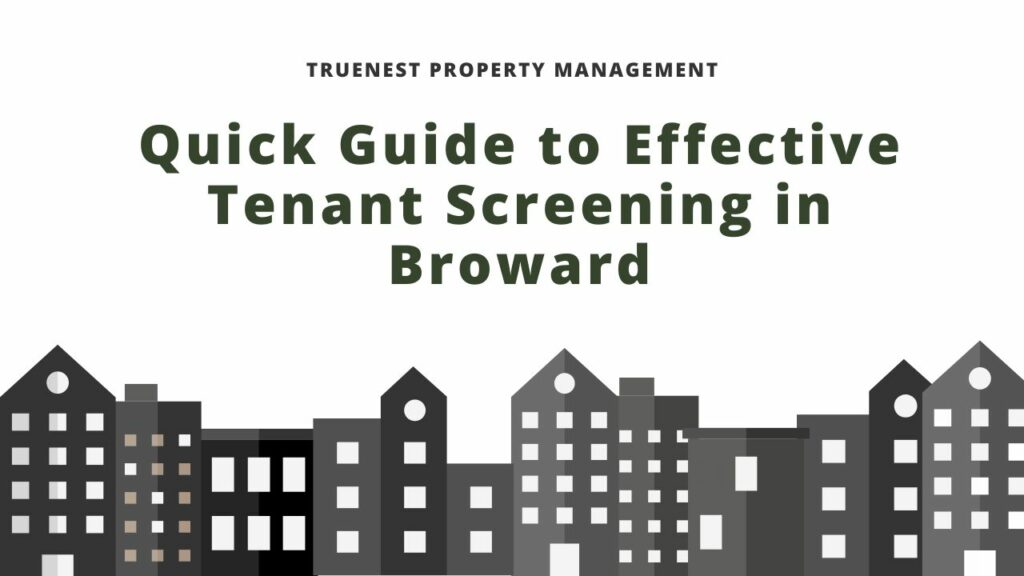Quick Guide to Effective Tenant Screening in Broward

As a landlord, you have to know how to take care of your tenants and keep them happy. Once you find high-quality tenants, you should try everything you can to keep them.
But to find the perfect tenants, you should have a proper tenant screening in place. One of the main problems of being a landlord is having to deal with irresponsible tenants. These are tenants who cause property-related issues, such as not paying rent on time, creating damage to the property, and causing problems with the neighbors.
Dealing with bad tenants can cause a lot of stress and headaches. But bad tenants should be avoided in the first place. In order to do this, you have to make sure that you know how to identify quality tenants.
What Are Quality Tenants
Quality tenants are those who pay their rent on time, follow the rules and regulations of the lease, and perform their duties in taking care of the property. They are not involved in any illegal activities and maintain a good relationship with their neighbors. This allows you to save for other investments or even renovations.
When finding quality tenants, make sure that they have these five attributes:
- Financial capability to afford rent
- Stable financial resources or job stability
- Satisfactory rent history
- Clean criminal record
- Good credit standing

How to Screen Tenants Effectively
An effective tenant screening process is essential to help you identify quality tenants and avoid potentially difficult renters. Before you screen your applicants, make sure to create minimum criteria based on your personal preference. This will make it easier for you to eliminate those who do not pass the criteria.
For example, your criteria may include a minimum monthly household income and credit score. It’s important to know the rules and regulations under the federal Fair Housing Act and your local state law when setting your criteria. This can help you to avoid any requirements that would be deemed discriminatory against a certain protected class.
After setting the minimum standards for your applicants, you can follow the process below when screening tenants:
Pre-Screen Your Applicants
Once your marketing starts, you end up pre-screening your tenants based on your minimum criteria. This can help you save time and catch red flags early on. You can easily eliminate unqualified tenants based on your minimum requirements.
For instance, if you require tenants to have a good credit score and an applicant does not meet this requirement, you can automatically remove them from your list.
Review the Rental Application
Once you have eliminated those who do not meet your minimum requirements, you will then review each application from the remaining applicants. This is the stage where you should check the applicant’s income.

Ideally, the household income should be at least three times the amount of the rental price. But this could vary depending on your personal preference.
You should also make sure that the application forms contain all the necessary information, such as the contact details of the tenants, their employment information, past tenancies and their past landlords’ contact information, and authorization for credit and background checks.
Verify the Applicant’s Employment and Income
You need to verify an applicant’s employment to check if their income can cover the rent. This is also a great way to know if the applicant is being honest about their income and employment details.
If tenants submit fake references, you can easily catch them by researching the company online first. Tenants who fake the information on their application forms are red flags and should be automatically eliminated.
Contact Past Landlords
To ensure that the applicant was not involved in any issues related to their past tenancies, it’s best to get in touch with their previous landlords. Do not just contact the current landlord.
If you reach out to past landlords, make sure to ask about a vacancy first before asking about the applicant. This is to ensure that you are really talking to landlords. Some tenants might give fake information and let their friends or relatives pretend to be a landlord.

Once you are sure that you are speaking with the landlord, ask questions about the applicant’s tenancy history and if the landlord has encountered certain issues with them. If you can, it’s also best to talk to their past neighbors to know if they have had problems with the applicant in the past.
Analyze the Applicant’s Credit Reports
Ideally, a credit score of at least 680 is recommended. But if you are willing to accept tenants with lower credit scores, that would be okay too as long as you can establish that they are able to pay their rent on time.
Aside from credit reports, you should also check an applicant’s criminal record to ensure that they were not involved in an eviction case or any criminal cases in the past. You may also check the applicant’s outstanding debt and other issues you may think are necessary for your decision-making.
Accept or Deny the Applicant
Depending on the results of your screening, you can either accept or deny the applicant. You can decline an applicant in writing or through email. You don’t need to state the reason why you are refusing them. But make sure to keep a record of your screening results in case the applicant may claim discrimination.
Remind them of their duties and responsibilities as tenants, and make sure that they understand the consequences in case they fail to abide by the rules stated in the lease. Address any questions they may have and leave no room for confusion.
Bottom Line
Tenant screening is an incredibly important, yet often overlooked skill that landlords need to develop. So, if you have any further questions regarding this or any other aspect of Broward County property management, don’t hesitate to contact us at TrueNest Property Management.
